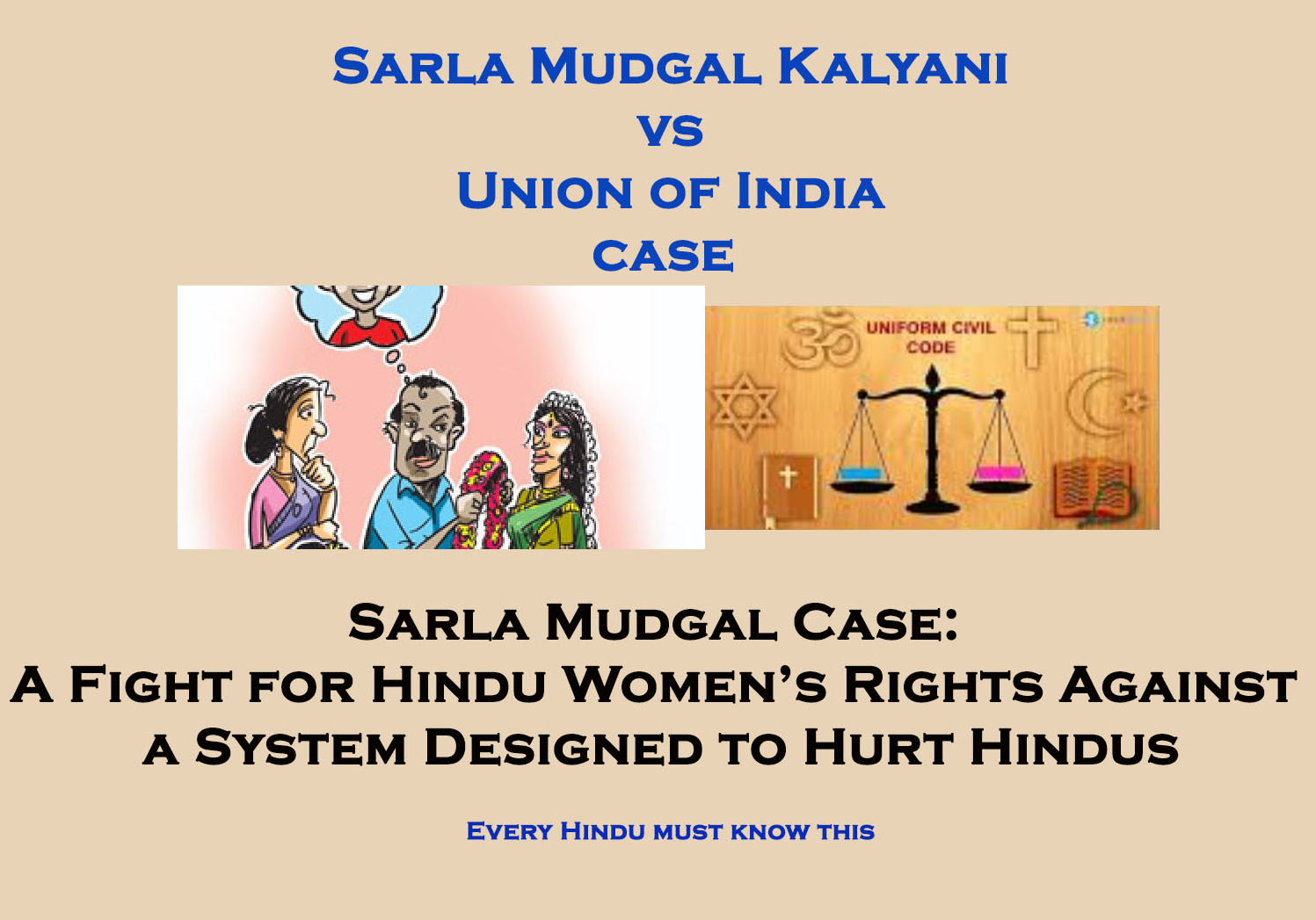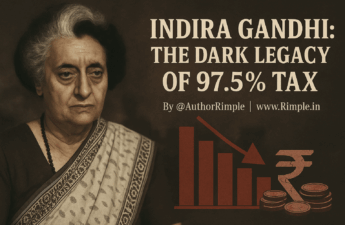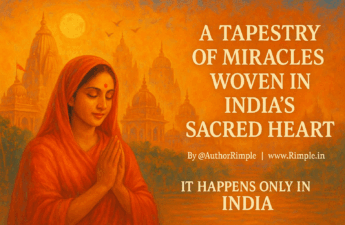The SMT Sarla Mudgal, President, Kalyani & Ors. vs. Union of India & Ors. case is a very important court case in India. It happened in 1995, and it shows the pain and suffering of Hindu women because of unfair laws and practices that came from British times, continued by the Congress government, and misused by some Muslims to hurt Hindus. This case is a big example of how Hindus have been betrayed for centuries by a system that doesn’t protect them. Let’s break this down in simple words so everyone can understand what happened, why Hindus suffered, and what the Supreme Court of India said about it.
What Was the Sarla Mudgal Case About?
This case started because many Hindu women were suffering. They went to the Supreme Court of India to ask for help. The Supreme Court is the highest court in India, and people can go there when they feel their rights are being taken away. The women who filed this case were:
- Sarla Mudgal: She was the president of a group called “Kalyani,” which works to help women and poor families who are in trouble.
- Meena Mathur: A Hindu woman whose husband cheated her.
- Sunita Narula (also called Fathima): She was the second wife of Meena’s husband after he converted to Islam.
- Geeta Rani: Another Hindu woman whose husband also left her by converting to Islam.
- Sushmita Ghosh: Another woman with a similar story.
These women were all Hindu wives whose husbands did something very unfair. Their husbands were Hindus when they got married, but later, they converted to Islam just to marry another woman without divorcing their first Hindu wife. Why did they do this? Because under Hindu law, a man can only have one wife (this is called monogamy). But under Muslim personal law in India, a man is allowed to have up to four wives (this is called polygamy). So, these men used this loophole to cheat their Hindu wives.
How Did This Hurt Hindu Women?
Let’s understand this with a simple example. Imagine a man named Ravi, a Hindu, marries a Hindu woman named Priya. They have a happy family with two kids. Under Hindu law, Ravi cannot marry another woman unless he divorces Priya. But one day, Ravi meets another woman, Zoya, and wants to marry her. Instead of divorcing Priya, Ravi converts to Islam and becomes Rahim. Now, as a Muslim, he claims he can marry Zoya because Muslim law allows him to have four wives. He doesn’t care about Priya’s feelings or her rights. Priya is left alone, with no support, and her family is broken. This is exactly what happened to Meena Mathur, Geeta Rani, and Sushmita Ghosh in the Sarla Mudgal case.
Here’s how this caused pain for Hindu women:
Broken Families: These Hindu women were left alone by their husbands. For example, Meena Mathur had three children with her husband Jitender Mathur. In 1988, she found out Jitender had converted to Islam and married Sunita Narula (who became Fathima). Jitender didn’t care about Meena or their kids anymore. Meena’s family was shattered, and she had no one to support her.
No Legal Protection: Under Hindu law, a man cannot marry again without divorcing his first wife. But because Jitender became a Muslim, he claimed Hindu law didn’t apply to him anymore. Meena couldn’t go to court to stop him because the law was unclear. She felt helpless.
Emotional Pain: Imagine being married to someone for years, having kids together, and then one day, your husband says, “I’m converting to Islam so I can marry someone else.” This is what happened to these women. Geeta Rani’s husband, Pradeep Kumar, even beat her so badly that her jawbone broke. Then he ran away with another woman, Deepa, after converting to Islam. Geeta was left with pain, both physical and emotional.
Financial Struggle: These women were often left with no money. For example, Sunita Narula (Fathima) said that after Jitender went back to Hinduism under pressure from Meena, he stopped supporting Sunita and their child. Sunita was a Muslim now, but she had no protection under Muslim law because Jitender went back to being Hindu. Hindu women like Meena and Geeta also got no financial help from their husbands after they converted.
Poverty Due to a Broken Judicial System: The British left India with a judicial system where justice takes years, sometimes decades, to be served. For Hindu women like Meena and Geeta, this meant years of fighting in court to get their rights. They had to pay for lawyers, court fees, and other expenses, which drained their savings and wealth. While waiting for justice, they also had to work to feed themselves, raise their children, pay for their education, and manage all household expenses alone. Many sold their gold, jewelry, and even properties to afford these costs, but justice still didn’t come in time. This pushed Hindu households into poverty, adding another layer of pain and suffering. The British designed this slow system to keep Hindus weak, and Congress did nothing to fix it, letting Hindu women struggle even more.
This case shows the deep suffering of Hindu women. They were betrayed by their husbands, and the laws in India didn’t protect them properly. The laws were unfair because they allowed men to misuse religion to escape their responsibilities.
Note: This is how Congress Govt opened up the market for legal conversions and illegal conversions, gunpoint conversions were already happening.
How Did British Rule Create This Problem?
The root of this problem goes back to the British rule in India, which lasted from the 1700s to 1947. The British wanted to control India, and they knew Hindus were the majority. To weaken Hindus, they made laws that hurt Hindu families and favored Muslims. Here’s how they did it:
Divide and Rule Policy: The British wanted to keep Hindus and Muslims fighting so they wouldn’t unite against British rule. After the 1857 Revolt, where many Hindus fought against the British, the British decided to favor Muslims. They saw Muslims as allies because some Muslims didn’t fully support the revolt. This was the start of a British-Muslim alliance that hurt Hindus.
Unfair Laws: The British made laws that encouraged Hindus to convert to Islam or Christianity. For example:
- Caste Disabilities Removal Act, 1850: If a Hindu converted to Islam or Christianity, they could still take their family’s property. This tempted many Hindus to convert, leaving their Hindu families poor.
- Special Marriage Act, 1872: This law allowed inter-religion marriages, often leading to conversions to Christianity. Muslims didn’t use this law much because they had their own Shariat laws, but Hindus were targeted.
Allowing Muslim Polygamy: The British let Muslims follow their personal laws, which allowed polygamy. But Hindus were forced to follow stricter laws. This created an unfair system where a Hindu man could convert to Islam to marry more women, but a Hindu woman had no way to stop him.
The British wanted to weaken Hindu society, and they succeeded by creating these laws. Hindu families were broken, and Hindu women suffered the most.
(Many film stars, businessmen and politicians also got converted to Islam to marry another woman without divorcing first wife. Not just common man). Dharmendra, Hema Malini, Mahesh Bhatt, Sharmila Tagore, etc all sound Hindu names but are actually converted to Islam.
How Did Congress Continue This Betrayal?
After India became independent in 1947, the Congress party, led by leaders like Jawaharlal Nehru and Mahatma Gandhi, ruled the country for many years. But instead of fixing the unfair laws made by the British, Congress made things worse for Hindus. Here’s how:
No Uniform Civil Code: The Indian Constitution (Article 44) says the government should make a Uniform Civil Code (UCC). This means one law for all religions—no separate laws for Hindus, Muslims, or Christians. A UCC would stop men from misusing Muslim laws to marry multiple women. But Congress never made this law. Nehru himself said in 1954, “The time is not ripe for a Uniform Civil Code.” Even after 41 years, by 1995 when the Sarla Mudgal case happened, Congress still didn’t act. They kept Muslim personal laws to please Muslim voters, but this hurt Hindu women like Meena and Geeta.
Note: (We need Uniform Civil Code for many reasons, this is just one of them)
Favoring Muslims Over Hindus: Congress continued the British policy of favoring Muslims. For example, in the Shah Bano case (1985), a Muslim woman named Shah Bano asked for maintenance money after her divorce. The Supreme Court said she should get it, but Congress passed a new law to cancel the court’s decision. This showed Congress cared more about Muslim votes than justice for women, whether Muslim or Hindu. Muslims came on streets to protest against giving maintenance money for Shah Bano. Why? Because in every Muslim house there will be 4 Shah Banos. Imagine how many women each man will have to pay for if every time a Muslim women went our constitutional courts instead of their Shariat law!
Ignoring Hindu Pain: Congress leaders knew Hindu women were suffering because of these loopholes, but they did nothing. They wanted to look “secular” (treating all religions equally), but in reality, they favored Muslims and Christians over Hindus. This left Hindu women like Meena Mathur and Geeta Rani with no protection.
Congress betrayed Hindus by not fixing the broken system. They let Hindu women suffer just to keep their political power.
Why Is This Anti-Muslim?
The Sarla Mudgal case also shows how Muslims misused their personal laws to hurt Hindus. Here’s why this case has an anti-Muslim angle:
Misusing Religion for Wrong Reasons: The husbands in this case, like Jitender Mathur and Pradeep Kumar, didn’t convert to Islam because they truly believed in it. They converted only to marry another woman. This was not about faith—it was about cheating their Hindu wives. They used Muslim law as a tool to escape Hindu law, which doesn’t allow a second marriage without divorce.
No Respect for Hindu Wives: These men didn’t care about the pain they caused their Hindu wives. For example, Jitender Mathur left Meena and their three children without any support. Pradeep Kumar beat Geeta Rani and then ran away with Deepa after converting to Islam. This shows a lack of respect for Hindu women and their rights.
Muslim Law Used to Harm Hindus: Muslim personal law in India allows a man to have four wives. While this might be okay for Muslims who follow their faith, it becomes a problem when Hindu men misuse it to cheat their wives. The Sarla Mudgal case shows how this law was used to hurt Hindu families, not to help Muslims practice their religion.
What Did the Supreme Court Say?
The Supreme Court heard the case in 1995, and the judges were Justice Kuldip Singh and Justice R.M. Sahai. They gave a very important judgment that supported Hindu women and tried to fix this unfair system. Here’s what they said, explained in simple words:
The Main Questions the Court Answered
The court had to answer two big questions:
- Can a Hindu man convert to Islam and marry another woman without divorcing his Hindu wife?
- If he does this, is he breaking the law under Section 494 of the Indian Penal Code (IPC)?
Section 494 of the IPC is a law that says if a person marries again while their first spouse is still alive, they are committing a crime called bigamy. They can go to jail for up to seven years.
The Court’s Decision
The Supreme Court said:
The Second Marriage Is Invalid: A Hindu man cannot convert to Islam and marry another woman without divorcing his first Hindu wife. The second marriage is not legal. For example, Jitender Mathur’s marriage to Sunita Narula (Fathima) was not valid because he didn’t divorce Meena Mathur first.
The Husband Is Guilty of Bigamy: The court said that if a Hindu man does this, he is breaking the law under Section 494 of the IPC. So, men like Jitender Mathur and Pradeep Kumar were guilty of bigamy and could be punished.
Conversion Doesn’t End the First Marriage: Just because a man converts to Islam doesn’t mean his first Hindu marriage is over. The Hindu marriage can only end if there is a proper divorce under Hindu law. For example, Jitender was still married to Meena even after he became a Muslim.
Need for a Uniform Civil Code: The court said India needs a Uniform Civil Code (UCC) to stop these problems. A UCC would mean one law for everyone, so men can’t misuse Muslim laws to cheat their Hindu wives. The court was upset that Congress hadn’t made this law even after 41 years of independence.
Why This Was Good for Hindus
The Supreme Court’s decision was a big win for Hindu women:
Protection for Hindu Wives: The court said Hindu women like Meena and Geeta have rights. Their husbands can’t just convert to Islam and marry someone else. This gave Hindu women some safety and respect.
Stopping the Misuse of Religion: The court stopped men from misusing Islam to cheat their wives. This was a strong message that religion cannot be used to hurt others.
Pushing for Fair Laws: By asking for a Uniform Civil Code, the court told the government to make laws that treat everyone equally. This would stop the unfair treatment of Hindus that started with the British and continued under Congress.
The Supreme Court Judgment (Simplified)
Here’s a simplified version of what the Supreme Court wrote in its judgment:
Justice Kuldip Singh said: “The State shall try to make a uniform civil code for all citizens of India” (this is from Article 44 of the Constitution). This is important for national unity. Pandit Jawaharlal Nehru said in 1954 that the time wasn’t right for a UCC, but even after 41 years, the government hasn’t done anything. We hold that the second marriage of a Hindu husband after converting to Islam, without divorcing his first wife, is invalid. This second marriage breaks Section 494 of the IPC, and the husband is guilty of bigamy.
Justice R.M. Sahai said: This is a sensitive issue. We need to think about justice for everyone. A law should be made to stop people from misusing religion. For example, a rule can say that if someone changes their religion, they cannot marry again unless they divorce their first spouse. This rule should apply to everyone—Hindus, Muslims, Christians, Sikhs, Jains, or Buddhists.
The court’s judgment was clear: Hindu women deserve justice, and the system needs to change to protect them.
Note: This judgement of SC was given in the year 1995. Today we are at 2025. Even today after 30 years, UCC is still pending. Congress did nothing to change this in 41 years since independence and 19 years after this judgement. Then in 2014 Narendra Modi Government comes in power. It is working hard on passing the UCC but is facing many protests and problems from Congress, Muslims, many politicians and also entire Jihadis and Deep-State Eco-system. But we can be rest assured that it will be passed soon under PM Modi’s leadership. Congress did nothing for Hindus in 67 years, and not even after Supreme Court’s judgement.
How This Case Reflects the Pain of Hindus
The Sarla Mudgal case is like a mirror that shows the pain Hindus have faced for centuries. Here’s how:
Centuries of Betrayal: The British started this problem by making laws that hurt Hindus and favored Muslims. They wanted to weaken Hindus so they could control India easily. Congress continued this betrayal by not fixing these laws, even after independence. They cared more about votes than about Hindu women’s suffering.
Hindu Women as Victims: Hindu women like Meena, Geeta, and Sushmita are the biggest victims. They trusted their husbands, but their husbands used a loophole in Muslim law to abandon them. This broke their families, left them with no money, and caused them deep emotional pain.
Unfair System Against Hindus: The laws in India were unfair to Hindus. Hindu men were forced to follow strict rules (only one wife), but they could escape these rules by converting to Islam. Muslims had their own laws that allowed polygamy, and some misused this to hurt Hindus. Congress didn’t stop this because they wanted to look “secular,” but this hurt Hindus the most.
A Call for Justice: The Sarla Mudgal case shows that Hindus have been asking for fairness for a long time. The Supreme Court’s judgment was a small step toward justice, but it also showed how much more needs to be done. A Uniform Civil Code is still not in place, even in 2025, 30 years after this case.
Conclusion: Hindus Must Wake Up to the Truth
The Sarla Mudgal case is a loud wake-up call for Hindus. It shows how Hindus, especially Hindu women, have suffered because of a system that was designed to hurt them. The British created this system to divide and rule India. Congress continued it to keep their power, even if it meant betraying Hindus. Some people misused Muslim laws to cheat Hindu women, leaving them with broken families and no support. The Supreme Court tried to help by saying these second marriages are illegal and by asking for a Uniform Civil Code, but the government still hasn’t listened.
Hindus need to understand this truth and demand fairness. They need to push for a Uniform Civil Code so that everyone in India follows the same laws, and no one can misuse religion to hurt others. The pain of Meena Mathur, Geeta Rani, and Sushmita Ghosh is the pain of millions of Hindus. It’s time for Hindus to stand up and fight for their rights, so their families and traditions are protected from this centuries-long conspiracy.
Systematic Erasure of Hindus
Note: This is a follow-up article for (click link to read this article) The Systematic Erasure of Hindus: A Centuries-Long Conspiracy by British, Congress, Muslims, and Christians





